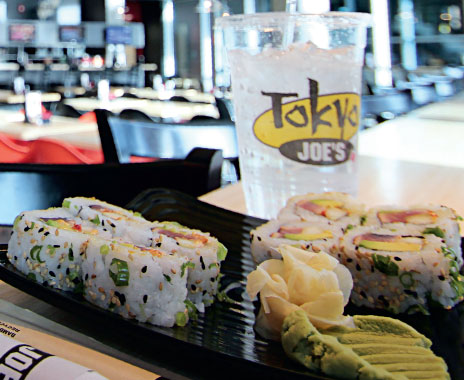While fast-casual giant Chipotle has grown to more than 1,000 locations in the past two decades, another fast-casual chain that also started in Denver around the same time has seen quieter growth.
Like Chipotle, the 29-unit Tokyo Joe’s serves natural meats and mostly organic veggies, focusing on health and freshness for the modern consumer.
“I had the idea to do clean, healthy Asian food this way before the fast-casual sector really existed,” says Larry Leith, Tokyo Joe’s founder and chief innovation officer. “There was one Chipotle at the time, but I didn’t know about it. I did meet [Chipotle founder] Steve [Ells] early on, but our path at Tokyo Joe’s has been a bit slower.”
In 18 years, Tokyo Joe’s has limited its growth to corporate-owned locations in Colorado. The decision to partner with middle-market private equity firm Gridiron Capital LLC and name veteran restaurant executive Greg MacDonald as CEO in 2013 positioned the concept for more rapid growth. Tokyo Joe’s management team has plans to expand the concept into several states over the next decade.
Tokyo Joe's
Founder: Larry Leith
HQ: Denver
Year Started: 1996
Annual Sales: $31 million
Total Units: 29
Franchise units: 0
“I love the brand and the people in this company,” Leith says about his decision to partner with Gridiron. “I wanted to offer the opportunity for our staff to grow personally and exponentially, and I want more and more people to get the opportunity to eat Tokyo Joe’s food.”
The menu at Tokyo Joe’s consists of both signature and made-to-order rice and noodle bowls, as well as signature salads and sushi rolls. Everything is either steamed or grilled, and nothing on the menu contains MSG.
The menu may be Asian-inspired, but the name Tokyo Joe’s comes from Leith’s desire to serve food that is approachable to the average American “Joe.”
For the build-your-own bowls, customers pick one protein from a lineup of chicken, steak, salmon, or tofu, and either white rice, brown rice, or udon noodles. They can then add up to five veggies, including edamame beans, snap peas, and bamboo shoots, and a sauce, which ranges from classic Teriyaki to more unusual options like a hot Dragon sauce, a tropical Curry sauce, and a spicy Green Curry sauce flavored with lime and coconut. All sauces and dressings are made in-house from proprietary recipes.
Signature bowls take the guesswork out of ordering for customers and include the popular Yakitori Bowl, made with white chicken, ramen noodles, spinach, broccoli, carrots, zucchini, red pepper, and a house-made chili-peanut yakitori sauce. The Mahi-Mahi Bowl features wild fish with tropical salsa, macadamia nuts, and sweet lemongrass in a teriyaki sauce.
Sushi rolls are made to order and include the classic California roll, with crab, avocado, and cucumber, and the Joe’s Roll with grilled shrimp, avocado, cream cheese, and cucumber. Bowls range in price from $5.10 to $8.45, and sushi is priced at $3.60 for four pieces or $6.10 for eight pieces. The average ticket at Tokyo Joe’s is about $10.
Leith says the brand buys as much organic produce as possible while still keeping prices reasonable.
“Our slogan is ‘Eat Good. Feel Good,’ so the fitness community is a huge consumer group for us,” Leith, a former professional skier, says. “We get a lot of athletes and competitors eating at Tokyo Joe’s because of that healthy, clean component.”
The focus on healthy choices is reflected in the beverage selection. All Tokyo Joe’s locations have a tea bar featuring both iced and hot teas.
“Hot teas are more traditional,” Leith says. “Our cold teas are our own blends.”
Though Tokyo Joe’s also carries traditional soft drinks, Leith says, he’s always been a fan of tea because “it’s a healthier beverage.” The teas at Tokyo Joe’s are either unsweetened or sweetened with stevia. Choices include Pomegranate Green Tea, Passion Fruit Black Tea, and Raspberry Hibiscus Herbal.
Leith is not only a proponent of healthy foods and beverages, but of relaxing while consuming them.
“We don’t push the carry-out component at Tokyo Joe’s,” he says. “We want people to dine in. We want them to take a break and enjoy their lunch or dinner so they leave refueled and feeling more energized. Our staffing, atmosphere, and food have to be in line with that.”
Leith says with its focus on quality ingredients and presentation, Tokyo Joe’s blurs the lines between full service and fast casual. Food is prepared “by real cooks in real kitchens and delivered to guests at their tables.”
Hand-rolling sushi and making sauces from scratch requires additional employee training, and while Tokyo Joe’s may have to pay higher wages to attract help with more advanced skill sets, the return is low turnover, Leith adds.
“You can start out in our company as a rookie and you can eventually learn how to make sushi, and that’s really cool,” he says. “It makes people happier with their jobs because they are more fulfilled. The more complicated nature of what we do is a positive.”
Because of the nature of the brand, Tokyo Joe’s will focus on growing intelligently, Leith says. “We’re never going to be driven by numbers,” he adds. “It’s all about quality.”
Growth plans include corporate stores in big cities like Phoenix and franchised stores in small and medium markets. Leith says Tokyo Joe’s is already known across the U.S. because of Denver’s popularity with business and casual travelers.
But even with a list of operators interested in franchising and the brand’s national name recognition, he says, he doesn’t expect the concept to grow at the rate Chipotle did.
Tokyo Joe’s corporate development goals are five new stores in 2014, 10 in 2015, and 20 each year in 2016 and 2017. Franchise goals are not as concrete, but Leith says he hopes to have a couple of multiunit franchisees in place and ready to open at least three stores in 2015.









